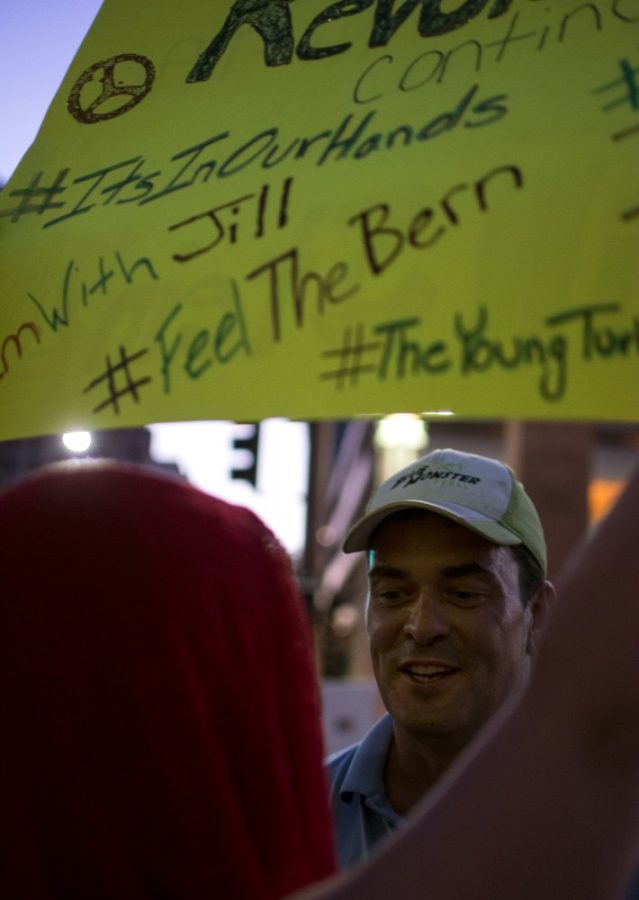“And what is Aleppo?”
With four words and a bashful puppy-dog look, former New Mexico governor and current Libertarian presidential candidate Gary Johnson made a fine argument against the seriousness of his own campaign.
Of course, this is but a spark against the raging inferno of half-informed nonsense that comes out of the Republican nominee’s mouth on a daily basis, but it does beg the question: Do third-party candidates really matter?
Despite a system that’s almost comically hostile to third-party presidential candidates, American politics has seen more than its fair share of them. They’re a colorful and motley bunch united only by their shared failure. They range from the Socialist Eugene V. Debs, who ran his 1920 campaign from prison, to Dixiecrat Strom Thurmond, who ran only to oppose the Democratic Party’s adoption of a civil rights platform in 1948.
One of the most frequently cited third-party runs in recent years has been that of Texas billionaire H. Ross Perot, who earned just shy of 20 million votes in 1992 but still failed to capture a single electoral vote.
RELATED: This November, why not elect the greatest evil? Vote Cthulhu 2016
As Steven Rosenstone, Roy Behr and Edward Lazarus argue in their “Third Parties in America,” Perot was not that impactful of a candidate.
Like a certain fellow billionaire, his platform revolved around the strength of his own character and not any particular policy position. Unlike said fellow billionaire, he actually self-funded most of his campaign, spending more than 60 million of his own dollars.
A message can outlive a candidate—unfortunately, that’s very difficult to accomplish when the candidate has no substantive message and “cleaning up the mess in Washington” does not count. In any case, billionaires with questionable messages no longer need to run third-party campaigns—they have the Republican Party for that now.
That brings us to George Wallace, former governor of Alabama, and up until June 2015, the most dangerous American presidential candidate in recent memory.
By 1968, Wallace had been a household name for some time. Five years before, he gained notoriety by trying to make good on his mantra of “segregation now, segregation tomorrow, segregation forever.”
In front of a constellation of flashbulbs on June 11, 1963, the diminutive governor placed himself on the steps of the University of Alabama, defying orders to integrate. Eventually, President John F. Kennedy called Wallace’s bluff and federalized the Alabama National Guard.
It didn’t matter, because Wallace had gotten what he wanted. His sweaty segregationist stand had achieved two aims: To earn an avalanche of free publicity and to present himself as the man willing to stand up to twin evils of integration and the spaniel-haired Kennedy brothers—Robert Kennedy was attorney general at the time.
With this, he headed into the 1968 race with a vengeance. Running under the banner of the American Independent Party, which was invented solely for the purpose of his candidacy, he won five states, 46 electoral votes and 13.5 percent of the popular vote. Richard Nixon won the presidency, narrowly defeating Democrat Hubert Humphrey.
This is an impressive result for a man who ran essentially on a platform of racism, “states’ rights” and an affinity for hair gel. Somewhat prophetically, Wallace understood the importance of an easily communicated message and a distinctive personality in the age of television.
There can be no argument that any rational person voted for him on the strength of his policy—as his running mate, he chose General Curtis LeMay. The nuke-loving LeMay was the basis for the character of the insane Gen. Turgidson in Stanley Kubrick’s “Dr. Strangelove.”
Wallace probably should have known this, because that picture was released four years earlier. It’s important to remember that George Wallace was pulling logic-defying stunts long before it was cool.
RELATED: Is this an election or an existential crisis?
This is especially prescient today, during a campaign that largely consists of logic-defying words and deeds. Much more so than in 1968, the 2016 race has become less a policy discussion and more a referendum on personality.
This is why Johnson does not stand a chance, even within the realm of third-party candidates.
The former governor has apparently tried to present himself as an amiable alternative to the chilliness of Secretary Clinton—and to the brash anger of Mr. Trump. In this he has succeeded too well. His air headed Aleppo query and his lackluster CNN town hall will make it difficult to be taken seriously as a policy-oriented candidate, and his inability and/or refusal to dominate headlines on his own terms makes it nigh impossible for him to reach the heights of Wallace, let alone those of Trump.
This is not a case against letting Johnson debate. If anything, his lackadaisical demeanor would be a relief during the bare-knuckle boxing matches the presidential debates are sure to become.
Perhaps one day in the near future, a third-party candidate will take the system by storm, and that will be a good day to be an opinions columnist. However, today is not that day and Gary Johnson is not that candidate.
And even a moderately successful third-party candidate will have to be able to mold their own image in the manner of Wallace and Trump, and at this rate, Johnson has already allowed his likeness to be sculpted by others.
Follow Raad Zaghloul on Twitter.









